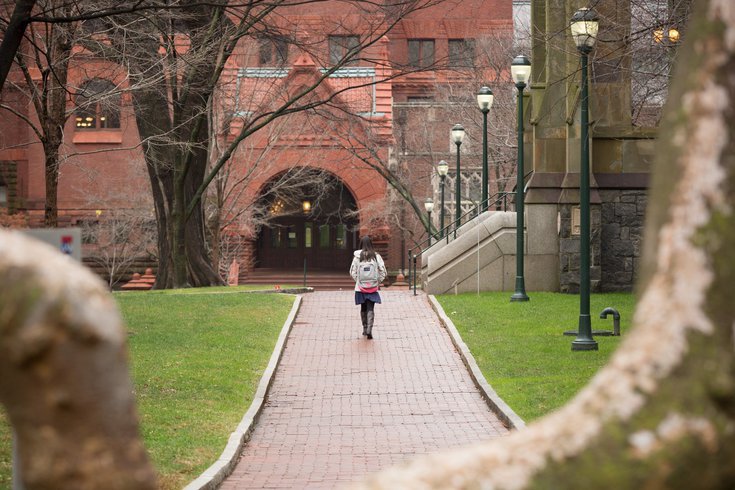
December 10, 2021
 Thom Carroll/for PhillyVoice
Thom Carroll/for PhillyVoice
The University of Pennsylvania announced a ban on indoor social gatherings, including parties and formals, after reporting a recent uptick in COVID-19 cases linked to these events. Philadelphia, which has seen case counts rise in recent weeks, could introduce additional restrictions heading into the winter months.
Philadelphia officials are weighing new COVID-19 restrictions, including a vaccine mandate for indoor dining, as cases and hospitalizations rise and the omicron variant adds uncertainties.
COVID-19 cases have climbed considerably in Philadelphia and the surrounding areas since Thanksgiving, mirroring a national trend. Across the U.S., cases now total more than 120,000 per day, a 26% increase from Nov. 22.
In Philadelphia, cases and hospitalizations have more than doubled since early November.
The city has averaged 463 new cases of COVID-19 per day over the last two weeks, increasing from an average of 218 cases per day during the two-week period ending Nov. 15. The health department reported that 366 patients with COVID-19 currently are being treated at Philadelphia hospitals, up from 171 on Nov. 15.
The possibility of introducing a vaccine mandate that would apply to restaurant workers and customers who dine indoors was first reported Thursday by the Inquirer. The health department and the mayor's office declined to address an indoor dining vaccine mandate when contacted Friday, but said that various options are under consideration.
"The city continues to consider strategies to address rising cases and hospitalizations," a city spokesperson said Friday. "We ask the public to continue following the Department of Public Health's COVID-19 guidance: getting vaccinated and boosted, wearing a mask (and double-masking in crowded and indoor settings), getting tested and staying home if you're sick."
Nearly 95% of adults in Philadelphia have received at least one dose of a COVID-19 vaccine, according to city data. More than 75% of adults are fully vaccinated and just over 70% of children ages 12 and older are fully vaccinated. Since August, more than 166,000 Philadelphia residents have received a booster shot.
The city already has a vaccine mandate in place for health care workers and higher education employees and students. A mandate covering city workers will take effect in January.
In terms of restrictions, Philadelphia maintained its indoor mask mandate during a dip in cases that occurred earlier in the fall. Health commissioner Dr. Cheryl Bettigole indicated last month that the mask mandate likely would remain in effect for the foreseeable future.
For months, restaurants and other venues have been given the option to either require proof of vaccination or adhere to the mask mandate, though compliance with the mask mandate has been spotty at many businesses across the city.
Last week, Bettigole said she would favor new restrictions and mandates if case counts were to continue on an upward trajectory, particularly with concerns about what will happen as omicron spreads.
"We don't know what's coming with omicron," Bettigole said. "I can say we would choose vaccine mandates and masking over more economically damaging measures, to the extent that those can succeed."
Early data seem to suggest that omicron may be more transmissible than delta and other COVID-19 variants, but that its associated illness may be milder. The World Health Organization said this week that the findings out of South Africa, where omicron was first detected, are limited and inconclusive. Vaccinated individuals still appear to fare better with the omicron variant than those who are unvaccinated.
With uncertainty heading into the winter, the University of Pennsylvania also moved this week to ban indoor social gatherings for the remainder of the semester, citing a rise in COVID-19 cases linked to these events.
Penn informed students that all parties, formals and unmasked indoor social events will not be permitted as the university tries to prevent the increase in cases from impacting academic activities. The ban does not include indoor dining, study sessions, final exams and performances.
There have not been any documented COVID-19 cases from classroom or workplace transmission, Penn officials said.
"As we head into the final weeks of the semester, it is our collective responsibility to mitigate further widespread positivity that would prevent students from completing their academic requirements and traveling home for the holidays," Penn officials said.
The university said it was concerned by the increasing COVID-19 test positivity rate in Philadelphia and Montgomery County. The city's test positivity rate climbed to 7% this week, up from 4.6% the week before Thanksgiving. Montgomery County's positivity rate reached 9.7%.
At Penn, all students, faculty and staff were required to get vaccinated for the fall semester. The university's decision to ban indoor social gatherings came after 133 community members tested positive for COVID-19 between Dec. 6-8, the majority of them linked to indoor gatherings.
With COVID-19 cases increasing across the region and the state, Pennsylvania hospitals have been sounding alarms about nearing capacity, especially entering a season in which higher rates of illness are anticipated. They continue to point to unvaccinated individuals as the primary source of hospitalization from COVID-19.
At Geisinger's hospitals in north-central Pennsylvania, more than 90% of COVID-19 patients receiving treatment were not vaccinated.
"I think what the vaccine is really effective at is preventing hospitalization and death," Geisinger CEO Dr. Jaewon Ryu told PennLive. "Are there breakthrough infections? Absolutely. But when you avoid and prevent hospitalization and death, it preserves beds, it preserves ICU capacity, it preserves ventilators, it preserves staffs … It allows us to continue to take care of non-COVID issues as well."